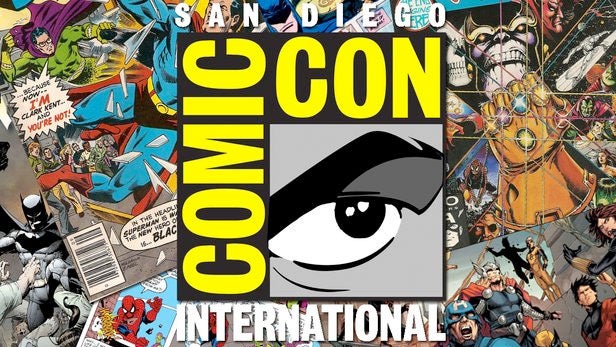What Comic Con can learn from E3 and GamesCom

OPINION: Nick Cowen explains what Comic Con attendees can learn from E3 and GamesCom when it comes to trailers and exclusive content.
About two weeks ago, geeks, nerds, gamers, comic book aficionados, Cosplayers and fans of the fantastic descended on San Diego to attend Comic-Con. There were movie panels galore, featuring some of the biggest names in Hollywood, discussing the ins and outs of some of the most hotly anticipated movies currently in production (Star Wars, Warcraft, Deadpool and Batman vs Superman to name a few).
There were also reams of trailers shown, and, as is the case every single year, fans recorded them with their smartphones and posted the footage on YouTube.
In spite of the fact most of them were the slightly out of focus and had soundtracks that sounded like a Boeing 747 coming in for landing, these fan-shot trailers racked up an impressive number of views.
So many, in fact, that one movie distributor threw its proverbial toys out of the pram.
About a day after the fan-captured ‘shaky cam’ trailer for the upcoming Suicide Squad movie appeared online, Warner Bros. decided to release it in glorious HD on YouTube. The move was met with much rejoicing – particularly from those who couldn’t attend Comic-Con – until Warner Bros soured the good will, by releasing the following statement:
“Warner Bros. Pictures and our anti-piracy team have worked tirelessly over the last 48 hours to contain the Suicide Squad footage that was pirated from Hall H on Saturday. “
“We regret this decision as it was our intention to keep the footage as a unique experience for the Comic Con crowd, but we cannot continue to allow the film to be represented by the poor quality of the pirated footage stolen from our presentation.”
Leaving aside the fact that the tone in that statement is more than a little confrontational – ‘Illegally’? ‘Stolen’? Really? – one has to question the wisdom behind withholding footage from the target audience – you know, the people most likely to buy tickets – of a superhero film.
The trailer itself, while very pretty, is nothing but a commercial, so why work to ‘contain’ its leak – especially when all that leak did was create a massive buzz around a film that a lot of commentators and fans were looking at quizzically before the footage was widely distributed?
Okay, so Warner Bros has a point about the quality of the footage that was originally posted online by fans. It doesn’t look great and it doesn’t exactly advertise the film in the best way possible.
But to rail against the trailer being posted online by fans shows a gross misunderstanding of the way social media works and the audience of the film – and the attendees of Comic-Con in general.
See also: Best Games 2015
http://www.youtube.com/watch?v=2uq4GksOUhA
Fans are going to leak trailers at Comic-Con. Like it or not, this is a reality that any attendee with a trailer to show off should wrap their collective head around. Anyone with a smartphone is capable of recording and posting trailers to social networks in seconds and once they’re online, they’re re-posted faster than any company can pull them down.
With that in mind, instead of expecting Comic-Con audiences to observe some sort of code of conduct, the companies that create and advertise their wares at the convention might be better off taking a leaf out of the gaming industry’s playbook. To wit, developers and publishers that attend E3, Gamescom, TGS, BlizzCon, QuakeCon, PAX – in fact pretty much any gaming expo you care to mention – release trailers only moments they’re shown to the audiences in attendance.
It doesn’t stop with adverts, either; lengthy demos are posted online once they’ve done the rounds at the keynotes. This is probably because the gaming companies know that the alternative is seeing footage of their wares posted up online by fans and, once again, it’s not exactly the best representation of their work.
See also: Best PS4 Games 2015
Furthermore, they’re also aware that not every single member of their audiences is able to attend the expos and conferencess they hold their keynotes and demos at. Some just don’t have the cash to splurge on hotels, flights and tickets while others live in regions so far away geographically from the venues that attending the likes of E3 or PAX is pretty much a fantasy.
These are the reasons events in the gaming industry can be watched on a livestream. It’s also the reason why Warner Bros’s decision “to keep the [Suicide Squad] footage as a unique experience for the Comic Con crowd” seems more than a little mean spirited. Overall, the entire PR snafu could’ve been handled better.
For proof of this, look no further than Legendary Pictures, who are set to release the Warcraft movie next year. After handing out two VR experiences to fans at their booth – along with Google Cardboard viewers to watch them – Legendary dumped the footage from the two VR commercials online.
You can have a gander at both Skies of Azeroth and Beware Crimson Peak in HD (with 360 panning available) just below.
See also: Best Xbox One Games 2015
Now that’s how you market a movie. Not with exclusive ‘unique experiences’ that have about as much chance of staying under wraps as information emailed to WikiLeaks. Instead you do it with awesome trailers that are made available to the widest audience as quickly as possible. Next Comic-Con, attendees should try releasing their trailers and footage online as quickly as possible; better to control the marketing than have it posted online in poor condition by fans and then throw a hissy…

